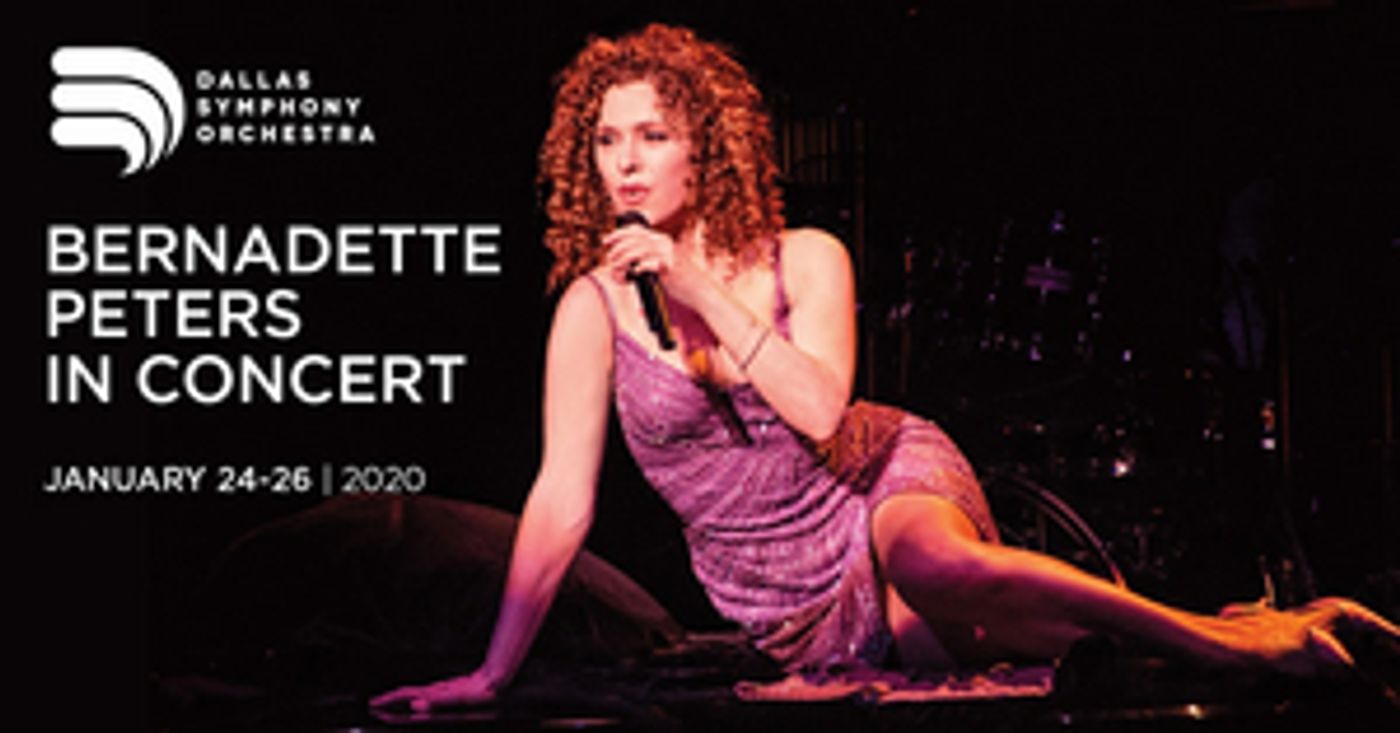Review: BERNADETTE PETERS IN CONCERT Brings Down the House at Dallas Symphony Orchestra

At the end of the first act of HELLO, DOLLY!, widowed matchmaker Dolly Levi asks her departed husband permission to marry again in the rousingly triumphant number "Before the Parade Passes By." Residents of the DFW area would be smart to take Dolly's message to heart and catch the incomparable Bernadette Peters in concert with the Dallas Symphony Orchestra. Peters plays at the Meyerson Symphony Center through January 26.
With a career spanning decades of nearly countless roles in theatre, film, and television, Bernadette Peters hard needs an introduction. In the last several years alone, she has appeared on Broadway in notable Tony Award-winning revivals of HELLO, DOLLY!, FOLLIES, and A LITTLE NIGHT MUSIC. Previous generations may know her from her turns in INTO THE WOODS, in which she originated the role of the Witch, and SUNDAY IN THE PARK WITH GEORGE, originating the role of Dot. This is to say nothing of her film work with artists such as Mel Brooks and Steve Martin or her television work with Carol Burnett and Amazon Studios. In short, audiences of all ages will be familiar with Peters's work in some way, becoming enchanted by her performances even if they may not know her from anywhere else.
The concert consists of numbers both old and new, numbers that Peters has made famous over her long career and those that she has only just started performing as she begins holding concert engagements again after an extended vacation (a sabbatical that makes for an amusing opening anecdote). As expected, Peters is consistently captivating, and she is one of those rare singers who devotes as much of her energy to a song's emotional performance necessary as she does to the song's technical quality--if not more so. Every number of the show is a mini-musical in and of itself, a small master class in embodying another life for a brief moment before carrying on to the next. Peters also takes great comfort in the magic of her own life, sharing laughs and touching stories with the audience in between numbers. Such transitions humanize the star, making her more approachable and ultimately all the more charming.
Without giving away too much of the program (half the fun is gasping in delight as you hear the opening chords of the next song), it's safe to say that Peters is at her best during the concert when singing numbers from the musicals of Stephen Sondheim. This comes as no surprise, seeing that many critics view her as being one of the foremost interpreters of Sondheim's works. Peters sings the ballads "No One Is Alone" and "Children Will Listen," both from INTO THE WOODS, with a distinctive earnestness that reaches every corner of the Meyerson's seemingly cavernous space. The lyrics-which drip from her lips like dew from a leaf on a crisp morning-feel at once weighted with melancholy yet driven by hope, as though Peters is trying to convey to her audience just how heartbreakingly beautiful a life worth living can be. Perhaps her best number of the night, though, is "Losing My Mind," from FOLLIES, a number that I personally often find dull and repetitive out of context but one that Peters manages to turn into a bravura performance, using the repetitions to drive the building sense of exhaustion that is meant to break down the singer by the end of the number. There's an argument to be made that her rendition ought to be the definitive one.
Privileging performance over quality is not without its risks, though. Toward the end of the evening, Peters's range seemed to narrow slightly, and--on two occasions--the higher notes toward the end of the song tottered just off-key before continuing without interruption again. Whether or not you are bothered by such blips depends upon your preferences as an audience member. There are more than enough highlights to soothe any hiccups.
As has become typical with the region's premiere orchestra, the Dallas Symphony Orchestra complements its vocalist with power, passion, and grace, adding dynamic layers to Peters's performance without ever threatening to overpower her. Their big band take of the Rodgers and Hammerstein classic "Nothing Like a Dame" offered a thrilling new rendition of a somewhat tired Broadway standard. Guest conductor Marvin Laird frequently accompanies Peters on piano, following her every riff and inventive variation with skill and style, a testament to the pair's long working relationship. This mix of Dallas's finest with New York legends makes for a stunning evening that should remind the city of just how lucky it is to have a world-class orchestra in the center of the arts district.
The concert also comes with a delightful surprise: a short opening performance of two compositions from Astor Piazzolla's The Four Seasons of Buenos Aires, as arranged by Leonid Desyatnikov. These selections accomplish three things. First, with the compositions' thrilling variations of moods and dynamics, the pieces act as a nice thematic overture for Peters's concert, which is itself built around expressions of the somber and the sublime. Second, this opening act showcases the impressive talent of Emmanuelle Boisvert, the DSO's Robert E. and Jean Ann Titus Family Violin Chair. Boisvert doesn't so much play the violin as she makes it an extension of her own body, and the music of her daring solos seems to come out of her twisting and confident form as it does from her instrument. Finally, and perhaps most importantly, it exposes audience members who are fans of Peters but perhaps less familiar with 20th-century classical music to some of the more inventive pieces currently being performed across the orchestra circuit. In this way, the concert combines the popular with the esoteric, the classical with the stunningly new, a welcome development that will hopefully show younger audiences how exciting an evening at the symphony can be.
Reader Reviews
Videos

